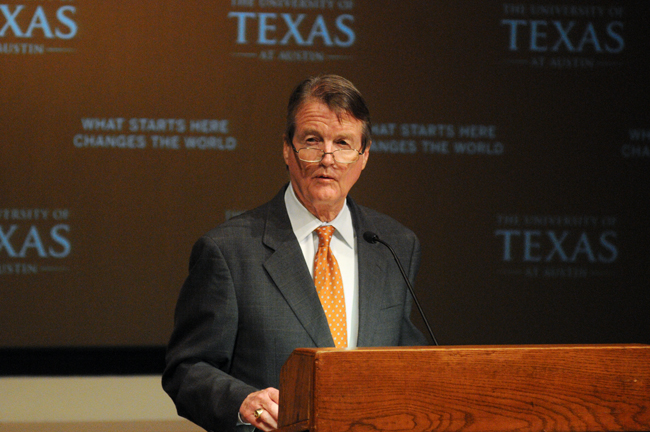Last week’s high-profile hearings of Regent Wallace Hall have highlighted what some see as a vendetta against UT President William Powers Jr. It has also brought out many of the president’s supporters, such as UT Student Government President Horacio Villarreal and Andrew Clark, president of the Senate of College Councils, who defended Powers for making the University competitive internationally.
The criticism from right-leaning regents centers on issues such as the Law School’s loan of $500,000 to former dean Larry Sager, personal administrative grudges and long-standing disagreements between Powers and the regents over tuition increases. On Powers’ left, some student activists and professors resist not only tuition hikes, but also cuts to cultural studies programs. But beyond specific issues, the larger debate is: How should we see our University? As a business? A factory? Or as a training ground teaching scholars to ask the tough questions?
In an environment where UT depends increasingly on private funds instead of state support, the idea of the university as a place for intellectual entrepreneurship replaces the idea of the university as a place for apprenticeship for critical thought. This shift dates back to the founding of mass public education and the case of Clark Kerr, who was president of the University of California in the 1960s and is considered the intellectual founder of the post-war U.S. public university.
A conflict between students and Kerr arose out of student defiance of Kerr’s ban on student political activity, and widened into a direct challenge of the vision he had created of a university at the service of private industry and national interests. As investigative journalist Seth Rosenfeld points out in his book “Subversives,” the University of California Board of Regents saw Kerr’s subsequent negotiation with students as threatening traditional university culture. Students saw the ban as one more example that Kerr was an agent of the “machine” that used the language of business and progress to stifle larger systemic debates. Today, Powers is portrayed by some regents as an embattled president not interested enough in four-year graduation rates and evaluation-based salaries. Budget-cut protesters see a mainstream president without the political will or wherewithal to defend vulnerable humanities programs.
UT’s and Berkeley’s conflicts and circumstances differ. Nevertheless, Kerr’s language during a period of economic prosperity, is strikingly similar to that of Powers, whose University faces a tightening budget despite Texas’ growth in the recession. Kerr, like Powers, was wedged between two factions — those in the university systems who wanted a more conformist university, and student activists who wanted a “humane” university involved in political struggles. Powers, like Kerr, emphasizes a harmonious vision of diversity in which competing interests dialogue with him, the arbitrator and the manager. Kerr’s speeches from that era are not that different from Powers’ most recent addresses. Powers often speaks in his State of the University Addresses of the University as a “business” that tries to maximize output in its “core competencies” to get maximum “return on investment.” Kerr spoke of the university “as a knowledge factory” in which the president was a “mediator” that facilitated the “production” of new research for private industry and national growth.
On the other side of the conceptual debate stood student activist Mario Savio. Savio argued that if Kerr saw the university as a firm with “the regents as the Board of Directors” and Kerr as the “manager,” students are “the raw material” to “be bought by clients.” He disagreed with Kerr’s business metaphor, saying students were human beings, not fodder for business. For university activists protesting the Faustian bargain of more budget cuts or higher tuition in the midst of new construction, these words are prophetic.
If we historically contextualize last week’s hearings, students will realize that ideological pressures, not economic circumstances, motivate university officials to reshape how we think about the role of a university education and our own humanity. As actors in this play, students should take a cue from Savio and question whether wrestling with tough economic times necessarily implies that we must become merely “efficient” consumers shopping for a university product.
Knoll is a first-year master’s student in Latin American studies from Dallas. Follow Knoll on Twitter @tknoll209K.





















